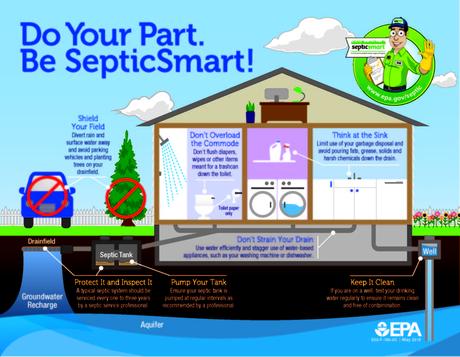
Replacing a septic system can cost thousands of dollars, which is why proper maintenance is critical. As with many other aspects of a home, preventative maintenance can help you avoid costly repairs down the road. The importance of maintaining your septic system reaches far beyond finances because it's also important to ensure your living space is healthy and safe. While septic systems maintenance can seem complicated, it's actually quite simple.
A septic system is comprised of a septic tank and drainfield located underground. This is where your wastewater is accumulated, which includes everything that goes down the drains in your home. One of the most important aspects of maintaining a septic system is making sure it's pumped every few years. On average, it should be pumped before you reach the five year mark. With preventative maintenance, you can prevent the septic system from breaking down prematurely. In fact, it's common for septic systems to last for 30 years when maintained.
Another critical aspect of maintaining a septic system is being careful about what you place in the garbage disposal. Unfortunately, it's common for people to put items in a garbage disposal that can clog up the system. For example, coffee grounds, cooking oils, and other items frequently used in the kitchen can damage your septic system. It's just as easy to place these items in a trash can as it is to put them in the garbage disposal.
Another way to maintain and preserve your septic system is by using appliances that are energy efficient. In fact, energy efficient appliances can prevent an excessive amount of water from going through your septic system. To maximize the benefits, you can choose Energy Star appliances because they often use half the amount of water used by other appliances. In addition to choosing energy efficient appliances, you'll need to make any necessary repairs promptly. This includes faucets that leak and toilets that have running water.
One of the biggest problems associated with damage to septic systems is flushing large items down the toilet. Actually, the items don't have to be large, they can be comprised of materials that don't dissolve well. For instance, there are some brands of toilet paper that are notorious for causing issues with septic systems. Other items that can be difficult to flush include feminine hygiene products, baby wipes and paper towels. The goal is to avoid flushing anything that's bulky or otherwise problematic.
While it might seem counterintuitive, it's important not to pour toxic chemicals down the drain because they can damage your septic system. This includes the shower, bathtub, kitchen and toilet. It's best to get advice from a professional if you have a clogged drain.

